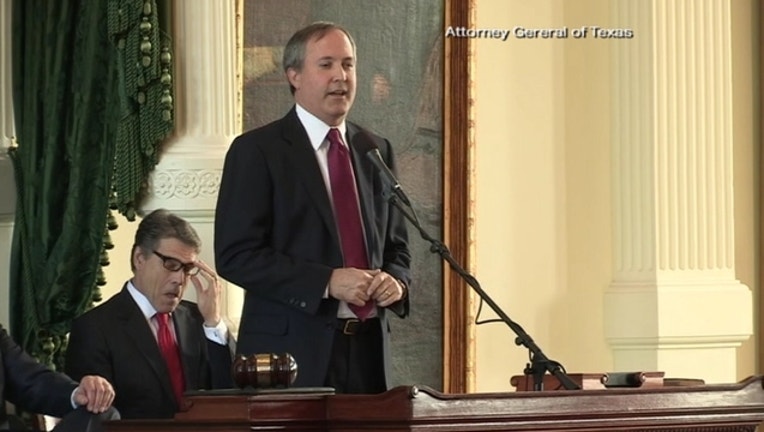Texas attorney general charged with federal securities fraud

AUSTIN, Texas (AP) -- Federal regulators filed civil securities fraud charges Monday against Texas Attorney General Ken Paxton over allegations that he deceived investors, the same claim that brought a felony indictment that has rocked the tea party-backed Republican's first 16 months on the job.
The U.S. Securities and Exchange Commission filed the civil lawsuit against Paxton and former executives of Servergy Inc., a high-tech startup that paid Paxton in the form of 100,000 shares for bringing on wealthy investors in 2011. Federal regulators say Paxton raised $840,000 for Servergy without telling investors that he was being paid.
SEC investigators say Paxton intended to invest $100,000 of his own money into Servergy but that company founder Bill Mapp refused. The lawsuit alleges Paxton said Mapp told him, "I can't take your money. God doesn't want me to take your money."
Those same allegations led a grand jury in Paxton's hometown last summer to indict him on two counts of securities fraud, which carries a possible sentence of five to 99 years in prison. Paxton has pleaded not guilty in that case and has said he won't resign.
By filing a civil lawsuit, federal regulators aren't seeking prison time but instead want Paxton to pay back "any ill-gotten gains or unjust enrichment" and be ordered to pay additional financial penalties.
SEC investigators allege that one investor considered Paxton "a personal friend" and believed that Paxton was also investing in the company. According to the lawsuit, that investor "grew worried" when promised about product shipment failed to materialize and that Paxton "did nothing" to determine whether those representations were true.
That investor "would not have invested in Servergy had he known Paxton was being paid to promote the company," the lawsuit reads.
Paxton attorney Bill Mateja said he had not yet reviewed the civil federal lawsuit but expressed surprised that the SEC chose to file the charges a year after Paxton's criminal indictment.
"Like the criminal matter, Mr. Paxton vehemently denies the allegations in the civil lawsuit and looks forward to not only all of the facts coming out, but also to establishing his innocence in both the civil and criminal matters," Mateja said.
Paxton took office in January 2015 with strong tea party support. A year earlier, Texas Sen. Ted Cruz, a GOP presidential candidate, called him a "tireless conservative warrior" as Paxton trounced a moderate Republican challenger on the way to becoming Texas' top law enforcement officer.
During a heated GOP primary race in 2014, Paxton admitted to breaking state securities laws by not disclosing how he received commissions for referring his private law clients to a financial planner. He paid a $1,000 fine, downplayed it as an oversight and went on to handily beat an establishment Republican who counted former President George W. Bush as a supporter.
His victory fortified the power of the tea party in Texas, but questions about Paxton's financial dealings followed him into office.
A Dallas state appeals court is scheduled to take up the criminal indictments next month.

